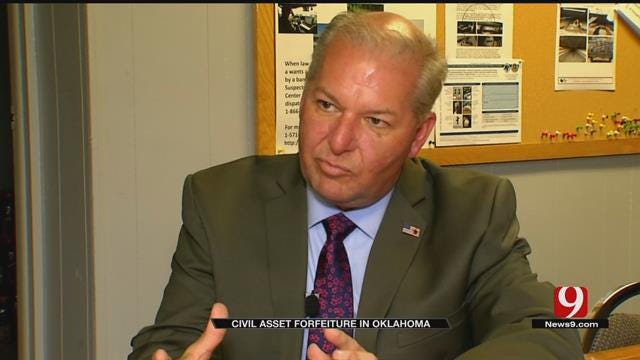Joint Police Team Defends Civil Asset Forfeiture In OK
<p>Civil asset forfeiture will likely be a hot topic in the state legislature next session.</p>Wednesday, July 27th 2016, 6:21 pm
Civil asset forfeiture will likely be a hot topic in the state legislature next session.
The law allows police to seize assets, like money, without making an arrest and without a warrant as long as officers have a probable cause to believe that what they are seizing was used in a crime. Local law enforcement says it’s a valuable tool to break up the flow of drugs and drug money coming through Oklahoma.
Hidden away in an old warehouse on the city's northeast side is headquarters for a joint police interdiction unit. One of their most powerful tools, the ability to seize assets.
News 9 can’t show you the officer’s faces or release their names. Also, News 9 can’t tell you where their headquarters are, or tell you the secrets they revealed to about how they target drug traffickers.
But the record of the Central Oklahoma Metro Interdiction Team speaks for itself. Last year, they seized 2,200 pounds of pot, 135 pounds of meth and 111 pounds of coke.
You haven’t heard about the seizures because they keep their tactics secret to trap traffickers. This is the first TV interview they've done since the team formed in 1996.
And yes, they do seize money through the civil asset forfeiture program.
"I do not apologize for what law enforcement does out there on the street because they're involved in legitimate criminal interdiction. Taking criminals off the street. And taking a lot of poison off the street as well,” said Oklahoma County District Attorney David Prater.
Prater says these are not cops shaking down motorists for money. They're highly trained to look for suspicious activity. And if probable cause exists, they have the right to seize cash and property.
"If I develop probable cause that 100 or 100 thousand dollars in cash are assets of criminal activity; proceeds of criminal activity I’m going to seize that,” said Prater.
"People are not being robbed on the side of the road by police. It's not happening,” said an officer.
Figures provided by the interdiction team show last year they seized $1.7 million. Eight cases are still pending, totaling $213,118.00.
“To date, none of that money has been ordered returned after a judicial review,” said Prater.
In many cases, suspicious money is returned on the spot. Sometimes when cash is seized, charges are not filed.
"When criminal cases are not being filed associated with a civil forfeiture action, you've gotta understand there's something else going on behind the scenes as well,” explained Prater. “It's not just because we're taking someone's stuff, telling them to go down the road and don't say anything about it."
For example, Prater says, often a drug mule will be cut free because there isn't enough evidence for a conviction. Or a deal is struck to catch a higher level supplier.
Members are concerned new legislation could tie their hands. They acknowledge, not all interdiction teams are trained as well as they are and standards could be put into place. That's conversation they want to have with lawmakers.
“If you talk directly to the officers that do it you will get a greater understanding and probably agree 100-percent with what we do and why we do it."
Thursday, Senator Kyle Loveless, a big supporter of civil asset forfeiture reform, will be speaking at a legislative conference in Indianapolis about legislation he proposed last session. A News 9 crew will be flying to Indianapolis to cover the speech and get other states’ reactions.
Prater has invited Loveless to ride along with the COMIT team. Loveless says he is interested, but hasn’t yet found the time.
More Like This
July 27th, 2016
March 22nd, 2024
March 14th, 2024
February 9th, 2024
Top Headlines
April 19th, 2024











